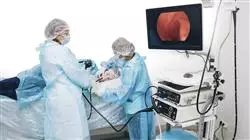University certificate
The world's largest faculty of medicine”
Description
A complete program that will update you in the management of inflammatory digestive diseases based on the latest advances and scientific findings”

The Master's Degree in Inflammatory Diseases for Digestive Medicine not only emphasizes the clinical data of the disease, but also the day-to-day management of the patient, and factors that make the evolution of a chronic disease such as inflammatory bowel disease different depending on nutritional, psychological aspects, management of complications or at different stages of life.
Addressing these issues makes this program different from other programs based on a mere incidence on clinical data, and makes the orientation much more practical and directed towards a multidisciplinary management with a joint vision of the patient.
This degree not only focuses on organizing the knowledge of clinical aspects, laboratory, radiological, endoscopic and treatment aspects, but it also focuses on factors that may not be specific to the disease itself, but that may have an impact on its evolution, management and quality of life. Among these are the nutritional aspects, both as a promoter of the disease as well as the nutritional management of these patients.
On the other hand, the content of this Master's Degree focuses on the field of inflammatory bowel disease in pediatrics, which is very different from that of adults. Similarly, the program delves into the management of patients in special situations, such as pregnancy, lactation or the need for vaccine protection, being especially practical in the knowledge of psychological aspects in inflammatory bowel disease. Likewise, a specific section has been designed to describe future scenarios and research, both in etiopathogenesis and in new treatments under development.
Finally, the work of a disciplinary team working side by side with nurses specialized in inflammatory bowel disease will be shown, as well as the development and operation of specific units for the management of this disease, which is a new and little homogenized aspect in daily clinical practice, so it also has a special section in this syllabus.
The resources in which the content of this professional master’s degree is organized are intended to give it a very practical approach, with syllabus organized in module, master classes in videos, as well as resolution of questions and real clinical cases. All of which will be in a 100% online format.
TECH Technological University offers you the most comprehensive and up-to-date program in the academic Panoramas. Through it you can get up to date on the diagnosis and therapeutics of inflammatory bowel disease"
This professional master’s degree in Inflammatory Diseases for Digestive Medicine contains the most complete and up-to-date scientific program on the market. The most important features include:
- The development of case studies presented by experts in inflammatory diseases
- The graphic, schematic, and practical contents with which they are created, provide scientific and practical information on the disciplines that are essential for professional practice
- Practical exercises where self-assessment can be used to improve learning
- Its special emphasis on innovative methodologies
- Theoretical lessons, questions to the expert, debate forums on controversial topics, and individual reflection assignments
- Content that is accessible from any fixed or portable device with an Internet connection
Distribute the course load at your own pace, without presential classes or fixed schedules, being able to perfectly combine your professional and academic responsibilities"
The program’s teaching staff includes professionals from the sector who contribute their work experience to this educational program, as well as renowned specialists from leading societies and prestigious universities.
Its multimedia content, developed with the latest educational technology, will allow professionals to learn in a contextual and situated learning environment, i.e., a simulated environment that will provide immersive education programmed to prepare in real situations.
The design of this program focuses on Problem-Based Learning, by means of which professionals must try to solve the different professional practice situations that arise during the academic year. This will be done with the help of an innovative system of interactive videos made by renowned experts.
It examines the new avenues of research that will shape the present and future approach to digestive medicine, including topics on nutrigenomics , precision medicine and artificial intelligence"

It delves into the latest developments in inflammatory bowel diseases, including developments in diagnostic methods and clinical manifestations"
Objectives
Given how complex the field of digestive medicine can be, the objective of this program is none other than to bring the most important developments and novelties of recent years to specialists in the area. Thus, in a period of 1 year you will have obtained a complete overview of the most rigorous and important scientific postulates, provided in a modern multimedia format and downloadable from any device with internet connection.

You will achieve your most ambitious updating goals thanks to the careful design and experience of the entire teaching staff"
General Objectives
- To update the knowledge of the origin, as well as the current scientific status of the diagnosis and treatment of IBD
- Manage nutritional and psychological aspects of the disease
- Manage different situations of this disease throughout life (childhood, senescence, pregnancy, lactation, controlled disease or outbreaks)
- Set up and manage specialized units for the management of Inflammatory Bowel Disease, creating teams composed of nurses, administrative personnel and physicians from other specialties such as radiologists, surgeons, pathologists, nutritionists or psychologists, among others
Specific Objectives
Module 1. Care and Pathophysiology of Inflammatory Bowel Disease
- To understand the etiopathogenic and pathophysiologic basis of inflammatory bowel disease
- Knowing how to differentiate between the different entities and their different behavior
- Advancing the diagnostic and therapeutic aspects of inflammatory bowel disease
Module 2. Clinical Manifestations in Inflammatory Bowel Disease
- Understand the different clinical expressions of the different entities that make up the group of diseases known as Inflammatory Bowel Disease
- Know how to make a differential diagnosis between ulcerative colitis and Crohn's disease, as well as how to differentiate between other systemic diseases with similar clinical expression
- Catalog the extraintestinal manifestations frequently associated with inflammatory bowel disease
Module 3. Diagnostic Methods in Inflammatory Bowel Disease
- Establish the analytical parameters useful to know the degree of activity of inflammatory bowel disease
- Know the data that abdominal ultrasound can provide as a diagnostic method and useful for the monitoring of Inflammatory Bowel Disease
- Manage the indications and main radiological features of CT and MRI in the diagnosis of inflammatory bowel disease
- Use the above features to establish a correct differential diagnosis between the entities that make up the group of inflammatory diseases with intestinal involvement
- Manage and know how to interpret the different clinical activity indexes
Module 4. Role of endoscopy in inflammatory bowel disease
- Understand and interpret the main endoscopic data in inflammatory bowel disease
- Know the indications for the performance of therapeutic maneuvers in patients with inflammatory bowel disease, as well as the management of complications
- Master the indications for performing capsule endoscopy of the small bowel and colon
- Manage endoscopic follow-up protocols in patients with inflammatory bowel disease, as well as establish strategies for the prevention of colorectal cancer
Module 5. Inflammatory Bowel Disease Specialty Basics
- Perform a correct assessment of the nutritional status of the patient with inflammatory bowel disease
- To assimilate the predisposing factors to develop inflammatory bowel disease from a nutritional point of view
- Manage the main characteristics of macro and micronutrients, as well as know how to detect the main deficiencies of these nutrients that appear in patients with inflammatory bowel disease, as well as their treatment
- To evaluate the different accesses for nutritional support (oral, enteral, parenteral), as well as to know the specific consumables, and to know their indications, compositions and duration
Module 6. Inflammatory Intestine Disease Surgery
- Delve into the current indications according to clinical guidelines for surgical treatment in patients with Inflammatory Bowel Disease
- Specialize in the different surgical techniques available
- Be aware of the complications that may occur, as well as the medical management of recurrence prevention in previously operated patients
- Manage surgical indications in special situations, mainly perianal pathology
- Point out innovations in surgical approach techniques in patients with Inflammatory Bowel Disease
Module 7. Inflammatory Bowel Disease Treatment
- Manage non-biologic systemic treatment in the different phases of Inflammatory Bowel Disease
- Master the different biologic drug options available in inflammatory bowel disease
- Optimize treatment according to available clinical guidelines
- Know management of medical treatment of patients in special situations (lactation, pregnancy, extraintestinal manifestations, etc.)
Module 8. Inflammatory Bowel Disease in Pediatrics
- Understand the differential aspects in epidemiology, etiopathogenesis, diagnosis and treatment between pediatric versus adult inflammatory bowel disease
- Acquire skills in stratifying treatment in the different phases of the disease in pediatric patients, as well as to know the indications, contraindications and complications of the use of these drugs in pediatric patients
- Take into account aspects of quality of life, growth impairment and behavior of the disease in adulthood when it appears in childhood
Module 9. Inflammatory Bowel Disease Specialty Care Units
- To deepen the structure, both physical and human resources, necessary to establish a Specialized Care Unit to patients with Inflammatory Bowel Disease
- Differentiate the diverse services involved in the care of these patients
- Establish protocols for action in special clinical situations
- Manage such a unit, regardless of the size of its work center
Module 10. New Research Avenues in Inflammatory Bowel Disease
- Update research studies in genetics, etiopathogenesis, gut microbiota relationship and nutrigenomics with Inflammatory Bowel Disease
- Update clinical trials with drugs that explore new routes of action against inter- and intracellular communication molecules
- Specialize the student in new endoscopic techniques, as well as artificial intelligence prototypes that may be useful for use in patients with Inflammatory Bowel Disease

Improve your medical skills by taking this Master's Degree in Inflammatory Diseases for Digestive Medicine"
Professional Master's Degree in Inflammatory Diseases for Digestive Medicine
The field of inflammatory bowel pathology encompasses a series of complex and constantly evolving diseases, which involve clinical, pathophysiological, diagnostic and therapeutic aspects in their approach. Therefore, this Professional Master's Degree in Inflammatory Diseases for Digestive Medicine aims to provide a comprehensive and multidisciplinary view of these conditions. In fact, it focuses not only on clinical data, but also on the management of the patient and the factors that may influence their evolution and quality of life.
It addresses with the greatest guarantees a complex range of inflammatory bowel diseases.
In addition, this Professional Master's Degree in Inflammatory Diseases for Digestive Medicine differs from other purely clinical approaches by addressing issues such as nutritional, psychological aspects and the management of complications, which can affect the evolution of these chronic diseases. In addition, the multidisciplinary approach of the program allows for a more practical and comprehensive approach to the management of patients with inflammatory bowel diseases. Always under a comfortable online modality, the student will be updated by consulting dynamic resources in the Virtual Campus, such as videos in detail, practical cases, self-evaluative exercises or master classes.







